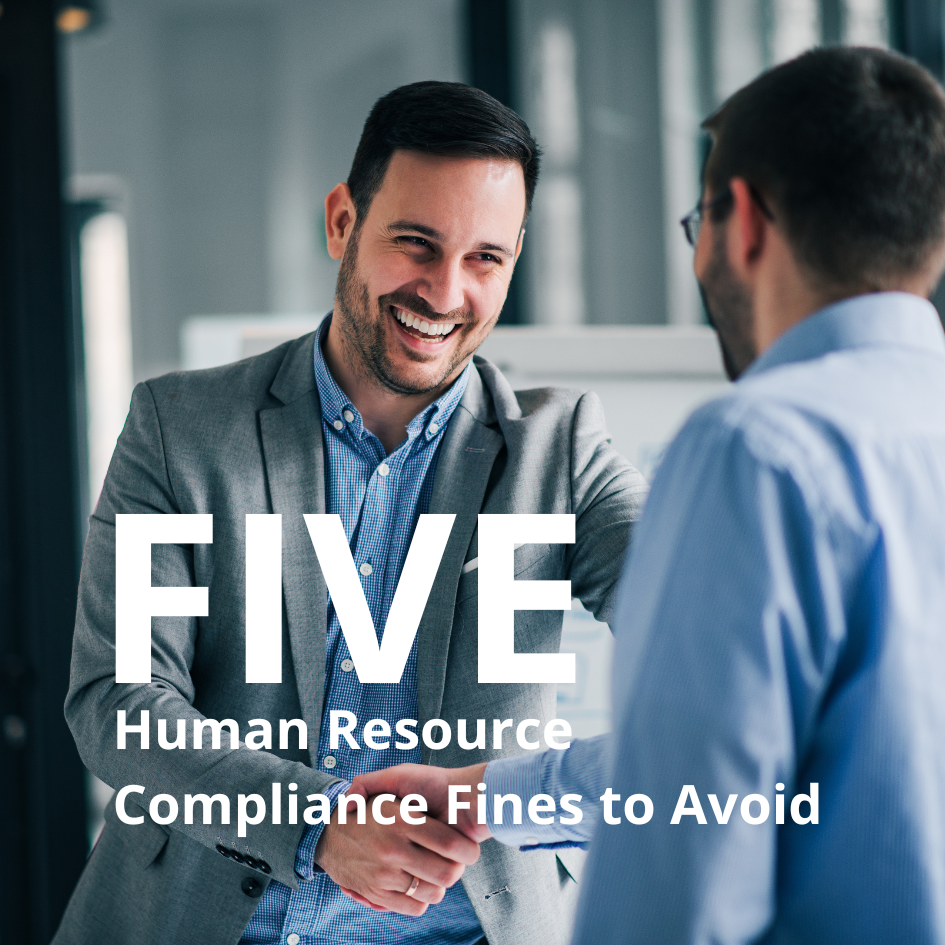
5 Human Resource Compliance Fines to Avoid
If you’re a small business owner, you know how quickly your team can grow. You also understand how complicated business compliance can be to keep up with. It’s a complex position to manage, from changes in regulations to business practices to shifts in workplace demographics.
To make one thing simple—not losing money—we’ve compiled the 5 most common human resource compliance fines so you can set up processes to ensure you aren’t assessed.
Affordable Care Act
Count the number of full-time employees you have and multiply it by $2,000. If this is a fine you’d like to avoid, keep reading. “ALE” or applicable large employees can face hefty fines for non-compliance with Affordable Care Act (ACA) regulations. Employers with 50 or more full-time equivalent employees who fail to offer minimum essential coverage may incur an annual penalty of $2,000 per full-time employee (minus the first 30).
Of course, you can also face other fines, such as coverage that doesn’t meet minimum value or affordability standards. Failure to file required information returns, such as Forms 1094-C and 1095-C, can also result in penalties of up to $270 per form.
Form I-9s
Every new employee is required to complete an I-9 form that verifies they are legally able to work in the U.S. This is done by or on the employee’s first day, and the employer must complete the section of the I-9 form within 3 days of the employee starting. Failure to do so or employing someone who is not legally permitted to work in the U.S. will flag costly fines.
Americans with Disabilities Act (ADA)
The Americans with Disabilities Act (ADA) requires businesses to provide reasonable accommodations for individuals with disabilities, ensuring equal access to goods, services, and employment opportunities. This includes requirements like removing physical barriers and modifying policies to accommodate disabilities.
Non-compliance can result in civil penalties of up to $75,000 for a first violation and $150,000 for subsequent violations. Additionally, businesses may face private lawsuits from individuals with disabilities, potentially leading to compensatory and punitive damages, as well as coverage of legal fees.
COBRA
The Consolidated Omnibus Budget Reconciliation Act (COBRA) requires employers with 20 or more employees to offer continuation of group health coverage to qualified beneficiaries after certain qualifying events, such as job loss or reduced hours.
Employers must provide COBRA notices to employees within specific timeframes and allow eligible individuals to maintain coverage for up to 18 months (or longer in some cases). Non-compliance can result in significant penalties.
The IRS may impose excise taxes of $100 per qualified beneficiary per day of violation, up to $200 per family per day, with a maximum penalty of $500,000 for unintentional violations. Additionally, the Department of Labor can levy fines of up to $110 per day for failing to provide initial COBRA notices, and affected individuals may file lawsuits seeking statutory penalties and legal fees.
Fair Labor Standards Act (FLSA)
The Fair Labor Standards Act, or FLSA, establishes minimum wage, overtime pay, recordkeeping, and youth employment standards for most private and public sector employers.
Essential requirements to remain compliant with FLSA include paying non-exempt employees at least the federal minimum wage (currently $7.25 per hour) and overtime at 1.5 times the regular rate for hours worked beyond 40 in a workweek.
Employers must also maintain accurate time and payroll records. Not only can violations result in significant penalties, but the Department of Labor can also impose fines of up to $1,100 per violation for repeated or willful minimum wage or overtime infractions. Employers may also face civil penalties of up to $10,000 per violation for child labor law infractions.
The Final Word: Maintaining Compliance
When you own a small business, it’s not just about making money; it’s also about mitigating your risks to protect that money. While this list is a good place to start to ensure that you remain compliant with application laws, regulations, and requirements, it’s wise to take it a step further.
Partnering with small business experts, like the bookkeeping and payroll specialists at Top 2 Bottom (T2B), can help support healthy financials and foundational practices such as compliance.
At Top 2 Bottom, we know there’s no one-size-fits-all package for small businesses. Schedule a personal consultation now to learn how our expertise can support you.
